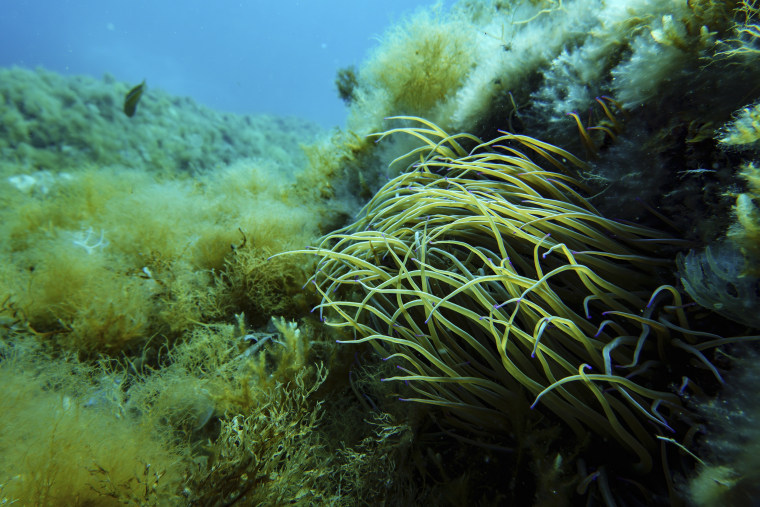Prince William says ocean conservation is a problem like no different forward of U.N. summit
The third U.N. Ocean Convention opens Monday, with Britain’s Prince William amongst these elevating the stress on nations to show a long time of guarantees into actual safety for the ocean.
The summit comes as simply 2.7% of the ocean is successfully shielded from harmful extractive actions, based on the nonprofit Marine Conservation Institute. That’s far beneath the goal agreed underneath the “30×30” pledge to preserve 30% of land and sea by 2030.
Atop this yr’s agenda is ratification of the Excessive Seas Treaty. Adopted in 2023, the treaty would for the primary time permit nations to ascertain marine protected areas in worldwide waters, which cowl practically two-thirds of the ocean and are largely ungoverned.
Talking forward of the convention, Britain’s Prince William stated Sunday that rising sea temperatures, plastic air pollution and overfishing have been placing stress on fragile ecosystems and the individuals who rely upon them.
“What as soon as appeared an ample useful resource is diminishing earlier than our eyes,” William, inheritor to the British throne, advised the Blue Economic system and Finance Discussion board in Monaco. He described the problem as being “like none we’ve got confronted earlier than”.
“Put merely: the ocean is underneath huge risk, however it may revive itself. However, provided that collectively, we act now,” he advised the assembly of buyers and policymakers.

Mauro Randone, regional tasks supervisor on the World Wildlife Fund’s Mediterranean Marine Initiative, stated that “it’s the Wild West on the market with nations simply fishing anyplace with none type of regulation, and that should change.”
“The excessive seas belong to everybody and nobody virtually on the similar time, and nations are lastly committing to ascertain some guidelines,” he added.
The ocean is vital in stabilizing Earth’s local weather and sustaining life. It generates 50% of the oxygen we breathe, absorbs round 30% of carbon dioxide emissions and captures greater than 90% of the surplus warmth brought on by these emissions. With out a wholesome ocean, consultants warn, local weather objectives will stay out of attain.
The treaty will solely come into drive as soon as 60 nations ratify it. As of Monday, simply 32 nations had. Advocates hope UNOC can construct sufficient momentum to cross the edge, which might permit for the primary official Oceans Convention of Events.
“Two-thirds of the ocean is areas past nationwide jurisdiction — that’s half our planet,” stated Minna Epps, director of worldwide ocean coverage on the Worldwide Union for Conservation of Nature. “We can’t presumably shield 30% of the ocean if it doesn’t embody the excessive seas.”
South Korea, France and the European Union have championed the treaty, however most massive ocean nations have but to ratify it, together with the remainder of the G20. 1000’s of attendees are anticipated in Good, from delegates and heads of state to scientists and business leaders. The USA has but to verify a proper delegation.
Past new commitments, the convention highlights the rising hole between marine safety declarations and real-world conservation.
France, the convention co-host, claims to have surpassed the 30% goal for marine safety. However environmental teams say solely 3% of French waters are absolutely shielded from dangerous actions resembling backside trawling and industrial fishing.

“The federal government declares these as protected areas, however it is a lie,” stated Enric Sala, founding father of the Nationwide Geographic Pristine Seas marine reserve undertaking. “Most of it’s political box-ticking. It’s all paper parks.”
That criticism is echoed throughout the continent. A brand new World Wildlife Fund report discovered that though greater than 11% of Europe’s marine space is designated for defense, simply 2% of E.U. waters have administration plans in place.
Fabien Boileau, director of marine protected areas at France’s Workplace for Biodiversity, acknowledged the presence of backside trawling in French protected areas, however stated it was a part of a phased technique.
“In France, we made the selection to designate massive marine protected areas with comparatively low ranges of regulation at first, betting that stronger protections can be developed over time via native governance,” he stated. “In the present day, we’re step by step rising the variety of zones with stricter protections inside these areas.”
Advocates say industrial fishing lobbies proceed to withstand stricter protections, regardless of proof that well-managed reserves enhance long-term fisheries via the “spillover impact,” whereby marine life prospers in close by waters.
“Safety shouldn’t be the issue — overfishing is the issue,” Sala stated. “The worst enemy of the fishing business is themselves.”
The convention will characteristic 10 panels on matters resembling blue finance, sustainable fisheries and plastic air pollution. Deep sea mining is anticipated to characteristic in broader discussions, whereas small island states are possible to make use of the platform to advocate for elevated local weather adaptation funding.
The end result of those discussions will type the premise of the Good Ocean Motion Plan, a declaration of voluntary commitments to be adopted by consensus and offered on the United Nations in New York this July.
“There can’t be a wholesome planet with no wholesome ocean,” stated Peter Thomson, U.N. particular envoy for the ocean. “It’s pressing enterprise for us all.”

